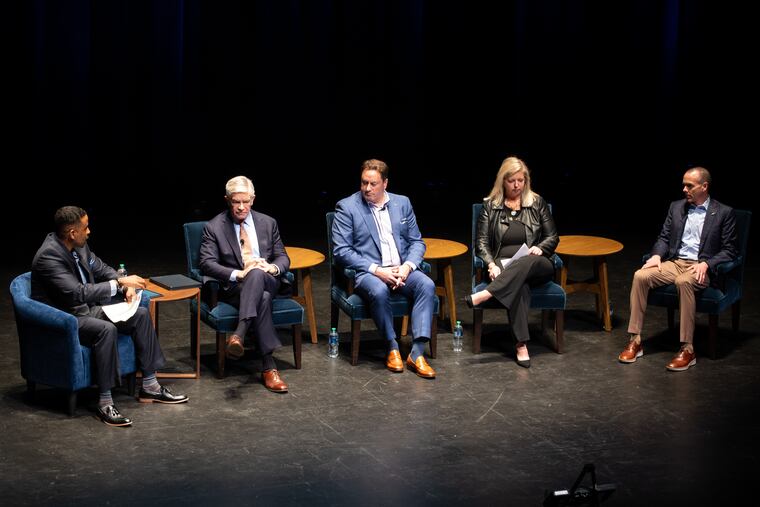Burnout, industry shifts and a likely recession: 3 hot takes from Philly business leaders
A likely recession looms and uncertainty remains, but business leaders at the Chamber of Commerce for Greater Philadelphia’s economic outlook expressed long-term optimism.

For better and worse, 2023 will likely look much different for Greater Philadelphia’s businesses, workers, and economy from the year before.
At the Chamber of Commerce for Greater Philadelphia’s economic outlook event on Friday, area business leaders made their predictions of what will come in the year ahead. They agreed that recession is a possibility, and inflation may slow. High-profile layoffs are happening at big companies, and hiring workers to fill vacant positions is still a challenge.
What does that all mean for the Philadelphia region? Here are three takeaways from their discussion.
Hiring is still a challenge across industries, and burnout isn’t helping.
The job market was already tight before COVID-19 hit, said Patrick Harker president of the Federal Reserve Bank of Philadelphia, and it’s only gotten worse.
The pandemic caused some people to retire early and caused the workforce to shrink because of illness and death, he said. At the same time, immigration slowed, and millions fewer workers entered the country, he noted.
A number of companies in the region are swamped with hiring work they can’t handle in-house, said Marcia Zaruba-O’Connor, president and CEO of the O’Connor Group, an HR and recruiting firm.
“A lot of burnout is going on because people are doing two or three jobs, because they can’t find the people themselves,” she said, and the ongoing overwork is causing people to leave their jobs.
Employers should be thinking about how to keep people, O’Connor said, which is sometimes as simple as saying thank you. They should also be prepared to invest in mental health, she said, estimating that mental health costs to businesses could double to quadruple in the coming years.
But one area is growing ripe for hiring, she said: luring back colleagues who left in recent years.
“Boomerangs are coming back,” O’Connor said. “Some people that left during COVID for a better job realized the grass wasn’t greener.”
Tech and life sciences are gaining importance.
Philadelphia’s longtime bread and butter — education and medical services (a.k.a. eds and meds) — still serve as important anchors for the local economy, said Harker, but that reliance is shrinking.
That’s a good thing, he said, because eds and meds aren’t recession-proof anymore: Enrollment is trending down at colleges and universities, and health care is becoming less regionally tied because of telemedicine and other tech advances.
He pointed to the importance of emerging industries, including life sciences, which employs over 70,000 workers in the Philadelphia region.
O’Connor noted that life sciences companies are getting more creative about training new workers and evaluating whether college degrees are even necessary for certain jobs, as they look to hire enough people.
Another area where employers are hungry for talent is in tech. That’s not just mainstay tech giants and burgeoning start-ups.
Wawa, for instance, makes its own customer-facing technology in-house and needs skilled people to do that. CEO Christopher Gheysens noted a gap between the amount of midlevel tech talent needed at regional businesses and how much is available nearby. That shortfall motivated Wawa’s plans to open a tech worker training hub in its former store at 19th and Market Streets.
A recession is likely but could be mitigated.
The odd combination of a strong job market and sluggish economic growth have created a feeling of uncertainty and “grind” for many, Lara Rhame, chief economist at FS Investments, said in a keynote before the panel discussion. The signs point to a likely recession, she said, and “if we don’t have a recession, it’s unlikely to be a year of really robust growth.”
However, Rhame added, recessions come in many shapes. While the most recent two recessions were severe, she said, previous ones in 1990 and 2001 were “shallow and rather short-lived.”
Harker, of the Philadelphia Fed, said it’s important that policymakers strike a balance that allows slowing inflation while preventing a big rise in unemployment. “I’m optimistic that we can execute some kind of soft landing,” he added.
With that in mind, local business leaders are still planning for growth, sometimes on a large scale.
Don Smolenski, president of the Philadelphia Eagles, noted a coming windfall from big sporting events already on the calendar for the next few years. The FIFA World Cup in 2026 is expected to bring in 450,000 visitors and have an economic impact of $450 million. And the city is hosting WWE’s WrestleMania in 2024, which had a $200 million economic impact in Dallas last year, he said.
Wawa is continuing on its path to double its 2020 store count to about 1,800 by 2030. Some of that will take place outside the region, Gheysens acknowledged, but much of it will be within the chain’s core markets, including Southeastern Pennsylvania.
“Any good business is going to make sure they’re tight and focused during an economic downturn, as we will,” Gheysens said, “but our planning ... is really decade-focused.”